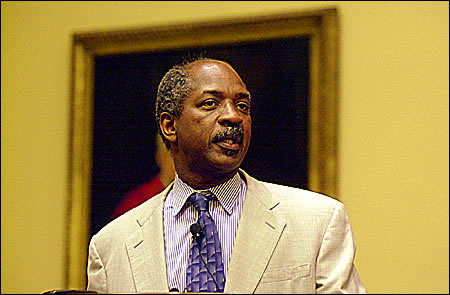African Americans may find new life in third party
Charles Ogletree criticizes Democratic Party’s recent commitments

Harvard Law School Professor Charles Ogletree Jr. issued a “call to arms” for Americans, in particular African Americans, to reject the status quo in American politics and consider new options for moving forward. Speaking Feb. 23 at the John F. Kennedy Jr. Forum, Ogletree noted that in modern history African Americans have been largely loyal to the Democratic Party, but that loyalty is running thin and could prompt the creation of a third political party.
A self-described “eternal optimist,” Ogletree said the past two national elections have given him pause as to whether African-American allegiance to the Democratic Party can continue. The Democratic Party, he said, “will have its work cut out for it to duplicate the massive and energetic turnout of black voters as witnessed in 2000 and 2004. The anger and frustration of the black community is palpable and it’s unlikely to subside anytime soon.”
Ogletree expressed frustration with what he sees as the party’s lack of understanding about its constituency. The party assumed, he noted, that anyone who’s interested in hip-hop is going to vote Democratic, but in reality, young people were attracted to such Republican ideas as privatization.
“The presumption is that everyone who is young and black is going to be a Democrat is now in question,” he said.
He also pointed to the party’s concession of the South in its strategy in national elections.
“With so many African Americans in Georgia, South Carolina, Mississippi, North Carolina, to pretend those states are not in play, there’s something wrong with the way we think about politics. Those states had African Americans who ran parts of those states for many parts of the 1800s and now have [African-American] populations of 30 and 40 percent and yet they’re completely dismissed. The Democratic Party said ‘You’re not going to vote, so we don’t care about you.’ I’d love to see some energy from that region of the country where we have incredible resources, where diverse candidates will be elected by diverse populations.”
While Ogletree said there are several up-and-coming African-American leaders in both parties – including Illinois Sen. Barack Obama and Ohio Secretary of State Kenneth Blackwell – the two-party system remains bleak for African Americans.
Recalling a time when African Americans exercised much greater political clout, Ogletree said African Americans need to return to past models of activism.
“It’s time to go back to the past and use the Reconstruction model to think about a third effort. African Americans are a wealthy and powerful entity, but we’ve never used that power to promote an independent political movement.”
Responding to a question from the audience about California activist and Green Party candidate Donna Warren’s intention to launch the Black Party, Ogletree said he encouraged such initiatives.
“I’m interested in all the new, interesting, outside-the-box efforts that are being made, because I think the two parties are so compromised and set in their ways that the idea of having real issues addressed is almost unspeakable. Will they win? No, but the idea is to get principled points of view on the table, serious debates and discussion that will make a difference.”
The forum event was sponsored by the Institute of Politics.




